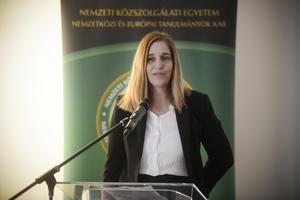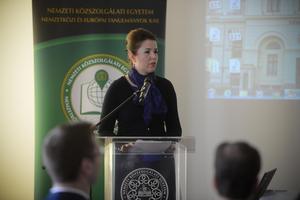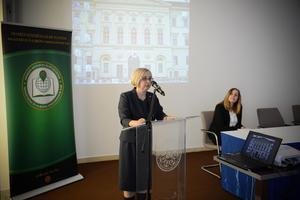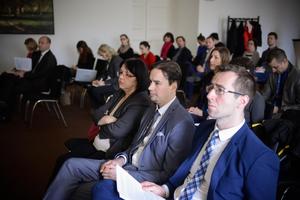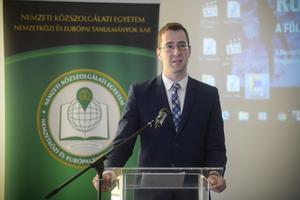The conference was organized by Orsolya Komlósi, Head of Anna Lindh Foundation Hungarian Network and by Dr. habil. Anna Molnár (Faculty of International and European Studies) in cooperation with the Hungarian Ministry of Human Capacities.
"On March 23 this is the fourth time that the Faculty of International and European Studies at National University of Public Service and the Anna Lindh Foundation have organized a joint conference on “Dialogue and Conflicts in the Mediterranean”, and the conferences have always been excellent" - opened the event Dr. habil. Boglárka Koller, dean of the Faculty of International and European Studies at the National University of Public Service. The dean highlighted the importance of the
Mediterranean region from a historical perspective, and spoke of Bulgaria, which holds the presidency of the Council of the European Union.
Ulyana Bogdanska, ambassador of Bulgaria to Hungary, also greeted the conference. In her opening remarks, she expressed satisfaction with the performance of Bulgaria's Presidency over the first three months. The Presidency's priorities were summarized in three points. The first was connection, which includes transport, energy, telecommunications and education. The second was security and stability while the third was solidarity.
In the first panel of the conference, Viktor Milanov represented the Hungarian Ministry of Foreign Affairs and Trade. He outlined the aspects of the Bulgarian Presidency of the European Union regarding the European integration of the Western Balkan countries. During the 6 months of the Presidency the aim is to make the best use of their expertise in the region without fostering false expectations while at the same time promoting reforms related to EU accession.
For Hungary, the Arab Spring has started in an inconvenient moment, explained Dr. habil. Erzsébet N. Rózsa, associate professor,Faculty of International and European Studies at National University of Public Service. The policy of global opening has only begun, in the first half of 2011, Hungary held the Presidency of the Council of the European Union, and the Lisbon Treaty just recently came into force. Hungary's bilateral relations in the Mediterranean region were given a new dimension, while multilateral relations in the frameworks of the European Union were characterized by excessively institutionalized cooperations.
The Mediterranean region has never played a crucial role in Polish foreign policy according to Dr habil. Justyna Zając, Professor at the University of Warsaw. Due to its geopolitical location, Poland’s interests and activities have been primarily directed towards its Eastern neighbourhood rather than Southern dimension. Nonetheless, in the aftermath of a dramatic increase of illegal immigration from Africa and the Middle East to Europe, Poland, as an EU member state, could not remain immune to the problems brewing on Europe’s southern shores.
In the first presentation of the second panel, MMag. Sherin Gharib, a Researcher Fellow at the Austrian Institute for International Affairs and a Lecturer at the Vienna University of Economics and Business, compared Tunisia and Egypt before and after the Arab Spring and examined the role of the European Union.
Dr. Maryna Vorotnyuk, Researcher of the CEU’s Center for European Neighborhood Studies examined the Turkey-EU relations from the security angle. She looked at how the external environment influences the strategic choices made by both parties in relation to each other; and noted, among other things, that EU-Turkish relations have never been as low as they are now.
Zoltán Egeresi, a Researcher at the National University of Public Service, in his presentation about Turkey and the Mediterranean provided an overview about these relations developed during the AKP governments. Since 2002, Turkey has played an active role in shaping world politics and has established close ties with its neighbours. It has emerged as a major actor in the Balkans and the Eastern Mediterranean.
Özge Memisoglu, PhD student, National University of Public Service talked about the connection of human rights and Turkish accession to the EU. She explained that the EU faced one of the most severe crises in its entire history. The massive influx of refugees and irregular migrants has become a common challenge requiring cooperation between the European Union and Turkey.
The Chair of the conference, Dr. habil. Anna Molnár highlighted the importance of principled pragmatism as it is mentioned at the Global Strategy for the European Union's Foreign and Security Policy in the concluding remarks
Text by: Faculty of International and European Studies
